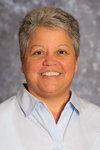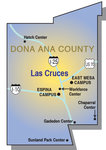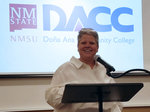Wind: 10.4 mph, S
Welcome to our new web site!
To give our readers a chance to experience all that our new website has to offer, we have made all content freely avaiable, through October 1, 2018.
During this time, print and digital subscribers will not need to log in to view our stories or e-editions.




“It’s a pretty exciting moment in higher education,” Doña Ana Community College President Monica Torres said in an interview.
While colleges and universities across the country have seen enrollments decline the last five years, especially since the onset of the pandemic, Torres said DACC is broadening its reach into and connection with the community it serves and is focused more than ever on the quality of each student’s college and life experience.
“We can’t think of higher education the way we’ve done historically,” said Torres, who has been DACC president since May 2019 after spending the previous five years as DACC’s vice president for academic affairs. “It’s more than what you offer and where you’re located.”
Because Covid-19 has intensified socio-economic disparities, displaced families and reduced opportunities for people of color and women, DACC has changed how it connects with students and potential students, she said.
Through direct assistance like DACC’s emergency aid fund and community partnerships, staff are connecting students who may be “one step from dropping out” with wrap-around services that include food, housing, transportation, childcare and other necessities, Torres said.
DACC’s Avanza (“advance”) program, funded by a grant from the W.K. Kellogg Foundation, is also helping low-income students with mentoring, career exploration and employment readiness.
DACC also has filled one of its recruiting positions with a community organizer, Torres said. That person will continue to visit high schools and job fairs, but also will reach out to “families not historically welcomed” into a community college setting, she said.
And, because private industry is also changing, DACC is more focused than ever on workforce development training.
That has meant “a different kind of community engagement for DACC,” Torres said, changing its question to businesses throughout Doña Ana County from “What can you do to help us?” to “How can we help you?”
DACC has also broadened its outreach into the community, talking more with nonprofits, churches and individual businesses and potential employers, Torres said.
The DACC dental clinic at on the NMSU campus in Las Cruces is one example. The clinic provides a wide range of dental services to the community at a reduced cost as it prepares students for careers as dental hygienists and for other jobs in the healthcare industry. The program also trains students as billing specialists.
DACC also plays an important role in film production in Doña Ana County. Its cutting-edge Creative Media Technology (CMT) program is training students for high-paying jobs on movie and television crews and in computer animation, digital video production and multi-media that have applications in existing and emerging industries.
DACC is in the design phase of a $5.4 million digital media facility that will “enhance and support research and economic development,” Torres said. The project is part of a “creative campus” partnership with NMSU, the City of Las Cruces, Las Cruces Public Schools, Burrell College of Osteopathic Medicine and others that could include in a multi-million-dollar film studio in Las Cruces.
DACC’s community engagement “is the best I’ve ever seen,” Torres said.
With six locations stretching from Sunland Park to Hatch, “We are part of the community,” she said.
As DACC continues to evolve to meet the changing needs of students and employers, there is one constant, Torres said: the focus on student success.
“Quality in the classroom is critical,” Torres said.